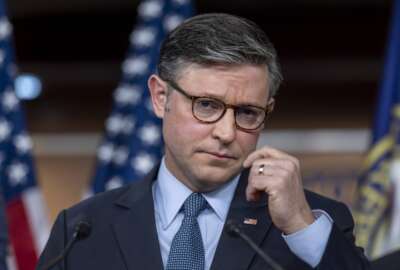Army puts brakes on insourcing
A directive signed this week by the secretary of the Army requires high-level review and analysis of any proposal to insource contracting functions. Outside groups...
wfedstaff | June 3, 2015 8:46 pm
By Jared Serbu
Reporter
Federal News Radio
A directive signed by Army Secretary John McHugh this week imposes new barriers to the further insourcing of contractors. The memo, issued Tuesday and made public on Thursday, said McHugh reserves the right to personally approve any insourcing proposal across the Army. Scroll down to read the entire memo.
The proposals must include careful study of alternatives to insourcing, the number of civilian federal employees the proposal would require, proof that funds are available to support those permanent civilian functions and a comprehensive legal review, the memo states.
The new policy appears to represent a shift from where McHugh said the Army was headed with insourcing in testimony before Congress last year. He told the Senate Armed Services committee that the Army intended to insource more than 11,000 jobs between fiscal years 2011 and 2015.
But that several months before Defense Secretary Robert Gates told reporters that DoD’s insourcing efforts were not yielding the cost savings the department had hoped.
“Part of the problem was that as we were reducing contractors, we weren’t seeing the savings we had hoped through insourcing,” Gates said at an August news conference. “The problem with contractors, what we’ve learned over the past year, is that you really don’t get at contractors by cutting people. You give a contractor a certain amount of money and they go hire however many people they think they need to perform that contract. So the only way, we’ve decided that you get at the contractor base is to cut the dollars.”
Gates ultimately decided to cut service support contracting by $6 billion over the next three years. The administration’s proposed Defense budget is expected to be made public Feb. 14.
McHugh’s memo said the Army must take a well-reasoned, analytic approach to insourcing during a time of constrained budgets.
That was a welcome sentiment to Stan Soloway, president of the Professional Services Council, which represents contractors. He said much of DoD’s insourcing up until now has appeared to be haphazard.
“It’s lacked adequate discipline and adequate analysis,” he said in an interview. “I think what Secretary McHugh has done with his recent memo is to acknowledge that and not only require more analysis but require more senior level review, in fact right out of his office. I think it’s a validation of the concern that we’ve had that the discipline needed hasn’t been there.”
Soloway’s group complained to Secretary Gates last summer that the insourcing initiative had morphed into what he called a quota-driven exercise, and that far too many of the jobs that were being brought in-house were not inherently governmental.
“Across the board, according to DoD itself, over half the positions that have been identified for insourcing over the last 18 to 24 months since Secretary Gates started the initiative are routine commercial positions,” he said. “They are not the kind of critical skills that Secretary Gates was targeting when he started the insourcing initiative. His goal was really to rebuild the critical skills, particularly, but not only, in acquisition.”
Congress evidently shared the view of Soloway and others when it passed the 2011 Defense authorization bill. Lawmakers supported DoD’s effort to build up its acquisition workforce – but prohibited any further insourcing that was based on quotas. It also ordered DoD to fully consider the full costs of contracting versus having work performed by civilian federal employees, and to prepare a full report on insourcing performed in 2010 by the end of this March.
Soloway said that’s exactly what’s needed.
“I think we need to step back and ask ourselves why we are presupposing with regard to either federal employees or contractors now what the right number might be, rather than really doing deep scrubs of what the department needs to be doing – what its missions are, what it can stop doing – and letting those analyses lead you to what mix of workforce you need.” he said. “It just has always struck me, whether it’s arbitrary insourcing or outsourcing targets or arbitrary FTE ceilings or cuts or whatever it might be, that you presuppose the outcome of what should be a pretty in-depth analysis.”
Soloway said he hopes the Navy and the Air Force will follow McHugh’s lead soon. The Army’s directive is effective immediately. McHugh wrote that the new policy will be in place for at least the next year.
(Copyright 2011 by FederalNewsRadio.com. All Rights Reserved.)
Copyright © 2024 Federal News Network. All rights reserved. This website is not intended for users located within the European Economic Area.





